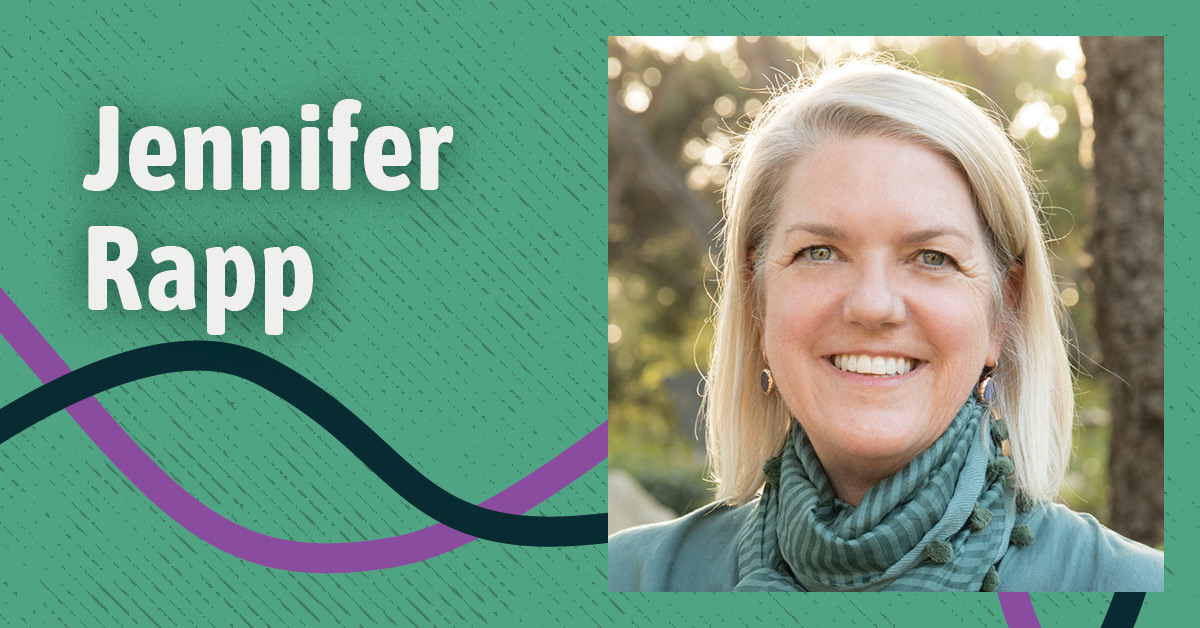Sometimes the things that cause us to change our lives are as small as a poem or a nagging thought. For other people—for instance, Jennifer Rapp, a recent graduate of the Master of Arts in Clinical Psychology program at Antioch Santa Barbara—life changes literally overnight.
It was the second week of 2018 when Rapp was yet again required to evacuate from her home in the steep hills above Santa Barbara. Evacuations were nothing novel for her; the month before, she had evacuated to a town 100 miles north to dodge wildfires and had ended up staying there for two nerve-fraying weeks. Now there were warnings of torrential rains, mudslides, and dangerous “debris flows.” Though she didn’t fully understand what those terms meant, Rapp dutifully grabbed her go-bag, leashed up her dog, and drove from her house to stay at her brother’s place down the road.
What happened next was terrifying. “We woke up in the middle of the night,” explains Rapp. “[My brother] John went down to try to move the car, saw the mud coming down, high-tailed it back in.” Over just five minutes, half an inch of rain had fallen on the mountains, causing the soil, no longer held in place by the roots of plants that had burned in the fires a month before, to begin flowing down the canyons, carrying boulders and branches—and, soon, cars and houses. Rapp and her family listened to the strange, terrifying sounds of the mud river. “We just had a really scary night,” says Rapp.
By the time the sun came up, the mud had stopped flowing. Her brother’s house was fine, “but we were surrounded by mud, lost all our cars, had three kids and two dogs that we were trying to kind of insulate from all of this. And then we were trapped there for several days.”
When Rapp finally walked out of the hills—on a sprained ankle, with only her dog and wallet and phone—she learned that her house no longer existed. It had been too close to the creek. It, and everything inside it, were crushed in the night.
With this event, Rapp’s life had changed. That was for sure. Or rather, her life had started changing. It was unclear how far-reaching these changes would be.
Three years later, Rapp has some answers. She’s overseen the rebuilding of her house—and actually managed to move in just before the pandemic started locking down society. She’s also started out on a new career path (her third) as a Marriage and Family Therapist. This March she graduated from Antioch University Santa Barbara with her Master of Arts in Clinical Psychology degree. During her studies, she received a Caregiver Grant that supported her traineeship at a local agency where she delivered therapy to those taking care of older family members. Perhaps most importantly, she’s come through the trauma of that horrible night feeling stronger and with a renewed sense of purpose. As she says, “If someone had been able to give me a little pill to see forward, it would have been nice and lovely… It’s so hard to see that when you’re in it.”
A Winding Path to Therapy
Rapp did not start her career knowing that she wanted to be a therapist. Actually, she trained to be a schoolteacher. Growing up in Santa Barbara, her plan was always to move somewhere else to establish a career. Her mom always made it sound like Santa Barbara was no place for an energetic young person. Her mother’s catchy phrase describing Santa Barbara was, “It’s for the newlywed and the nearly dead.”
So after Rapp graduated from the University of California, Santa Barbara, she moved to Los Angeles to do her teacher training. Then she spent a few years teaching elementary school in Oregon before settling in the Bay Area. She loved teaching and especially loved the way that a teacher can nurture a student and help them to grow. “That felt really wonderful,” she says.
After about a decade of teaching, she wrote a grant to bring innovative technology into her first-grade classroom. This began the gears to turning for a career change into the world of tech. Initially, she oversaw the use of these interactive, game-based approaches to helping support students learning to read. Soon the Parent Association wanted there to be a school-wide tech specialist. Rapp took that role, and then she decided that she wanted to take “a big right turn” and fully transition into tech.
This was made easy by living in San Francisco. She explains, “I had the advantage of start-up industry where you could make a jump like that very easily.” Rapp eventually found a position working in legal technology.
Rapp was successful in this work, and by 2012 she was beginning to think about retirement. She set an intention to retire back in Santa Barbara, where her brother, sister, and parents all still lived. As part of this plan, she bought a house in the hills near her parents. “I was going to rent that [out],” she says, “and then I was like, wait, why am I doing that?”
Over the decades since she graduated from college, the area had changed. Where once there were few career opportunities, now the seaside city was emerging as a popular place for technology companies fleeing the exorbitant rents of the Bay Area. She applied to work at one of the companies that had opened an office in town, a property management software company. She got that job and moved back home, into the house she’d just bought.
Even if the location was different the grow-grow-grow mindset of startup culture remained. “Work was really challenging,” says Rapp. “We were growing like crazy.” It was fun but also exhausting, and Rapp started dreaming of winding down her tech career and maybe becoming a therapist.
Tragedy Leads to Realization
Rapp explains how the change came suddenly: “I had always wanted to become a therapist but never could quite figure out how to make it work—financially, et cetera. And then the mudslide hit, and I lost my home.”
This brush with mortality caused her to start asking bigger questions. In the days and weeks after the slides, she would wonder, “What am I doing? This is not how I want to be doing my life.”
As she grappled with the trauma of losing her house and nearly losing her life, she started doing Eye Movement Desensitization and Reprocessing (EMDR) therapy with one of her longtime friends and mentors. This somatic therapy taps into the body’s unconscious processes to help encourage healing from traumatic experiences.
By the time a month had passed between the mudslides, Rapp felt more stabilized. One day, after a therapy session, she took her friend out to lunch. As they enjoyed their conversation, she said, “I’m thinking about doing this therapy thing again: going back to school.” Her friend responded with a reality check, saying, “Oh my god, Jen. If I could map this, we’ve been having this conversation once a year for the last ten years. It’s time. Do it.”
So she did. She enrolled in the Master of Arts in Clinical Psychology program at Antioch Santa Barbara and, as carpenters began to rebuild her house, she started her coursework to become a Marriage and Family Therapist.
A Program to Care for Caregivers
At first, she tried to balance being a full-time graduate student with continuing to work at her tech job. But this, on top of overseeing the reconstruction of her home, proved to be “too many moving parts.” She left the tech world and pursued her education and the development of her therapeutic skills wholeheartedly.
Leaving that job was, obviously, a pay cut. “I had to take a very deep breath and put pen to paper and figure out how the heck I was going to do it financially,” she says. At the same time, it was a shift in the feeling of her days. She says that “it’s been hard letting go of those more goal-oriented, fast-paced, observable, measurable deliverables” of working in business. “Therapy is a different kind of promise,” she explains. “It’s slower and gentler.”
The transition was eased when Rapp was awarded a scholarship through a special program offered by Antioch: the Caregiver Grant. This scholarship gives financial support to students who choose to spend their traineeship working with caregivers, which is to say anyone caring for a loved one over the age of sixty. This grant also supports Family Service Agency, which oversees the therapy sessions—all of which are free to the clients. The grant is financially supported by the Santa Barbara Foundation.
“So the typical client is a spouse or a child taking care of their partner or parent,” explains Rapp. These clients often are dealing with many burdens at once: “they’re dealing with launching their own children and managing their own lives and their own aging and their own families, as well as their parents.” And there are all sorts of difficult questions and decision points that caregivers navigate. Is one sibling taking on the heavier load? When should a parent be placed in a skilled nursing facility? How do you manage care? How do you manage finances?
These day-to-day details are matched with more big-picture questions and potential conflict. Rapp says that many of her clients were grappling with the difficulty of finding yourself managing “your parent who has now become more like your child. As they become older, you’re having to be the adult and make decisions for them, and they don’t love that. If they’re still with it.”
Rapp and the other student therapists working with this population in the Caregiver Grant program had the opportunity to hone their skills, helping this clientele through one-on-one psychotherapy sessions. And their supervisors guided them and shared expertise. Rapp also ran a support group of women who were all caregiving for older parents. This support group offered an environment for caregivers to support each other through the challenges they were facing.
Over and over again, Rapp heard her clients saying things like, “I just can’t talk to my friends about this. They don’t understand.” It was meaningful that they were able to get individualized support from Rapp, who especially during the pandemic was focused on sometimes-basic questions like, “Are you getting food? Are you getting outside? Are you connecting with people?”
The Caregiver Grant provided vital support to these caregivers, but it also gave Rapp a cohesive experience of her traineeship. Because Antioch and Family Service Agency (FSA) work so regularly and closely, she felt deeply supported as she took these first steps of becoming a therapist. “To have this seemingly connected hand-off between the school and the site just seemed helpful to me,” she says.
Rapp was glad to be part of this program, and it helped her think through how she might want to structure her own career as a therapist. She says that it gave her “exposure to what an agency looks like, what kinds of roles are there, and how people do it.” Both of her supervisors at FSA have private practices on the side, and she thinks that she wants to have a similar hybrid career path, so she can enjoy the flexibility of private practice while still being able to access the “social aspect and energy” of an office and collective endeavor.
The Caregiver Grant supported her completion of the degree, gave her valuable training, and helped her visualize her future career. She ultimately decided not to specialize in working with caregivers and elderly populations, in part because with her own parents living down the street, she foresees that she will be doing more caregiving work in her own personal life in the coming years. Spending her days supporting others in the same position, after a year of experience, proved not to be the right path for her. So instead she ended up pursuing the Somatic Specialization, learning about the ways the body experiences different things, especially trauma.
A Path of Healing and Curiosity
Today, Rapp’s life looks in many ways totally different than it did when the mudslide destroyed her house. But in other ways, there’s a deep continuity with her life story. In becoming a therapist, she’s returned to the passion for nurturing that initially brought her to become a schoolteacher.
“The simplest answer is that I want to help people,” Rapp says, explaining why this is how she’s chosen to spend her life. “But more than that,” she continues, “I am genuinely curious about the human experience and find this work humbling and rewarding.”
Things have come full circle in another way, too: her beloved house, which was destroyed by a climate catastrophe, has now been fully rebuilt. She says, “I moved in just before we went on lockdown and have been able to enjoy every inch of my new home. And I’m doing what I want to be doing.”




